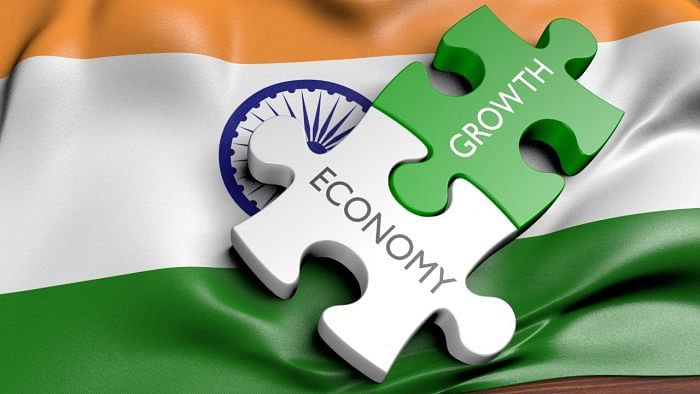
India Ratings and Research on Thursday said that the country's economy is likely to grow at 7.6 per cent year-on-year in 2022-23.
The agency said after a gap of two years, the Indian economy will show a meaningful expansion, as the real GDP in 2022-23 is expected to be 9.1 per cent higher than that in 2019-20 (pre-Covid level).
"However, the size of the Indian economy in FY23 will be 10.2 per cent lower than the FY23 GDP trend value. Continued weakness in private consumption and investment demand is estimated to contribute 43.4 per cent and 21 per cent, respectively, to this shortfall,” the agency said in a report.
It said if the impact of Omicron on the fourth-quarter growth turns out to be greater than its estimate, then there could be some upside to 2022-23 growth originating from the base effect.
Earlier this month, the National Statistical Office (NSO) in its first advance estimate said gross domestic product (GDP) is expected to grow at 9.2 per cent in 2021-22. The economy had contracted 7.3 per cent in the previous financial year.
Speaking to reporters, India Ratings' Principal Economist and Director Public Finance Sunil Kumar Sinha said the government and the RBI are expected to support the growth recovery.
He said the government will not be in a hurry to move towards fiscal consolidation, which means there will be a significant amount of fiscal deficit even in the 2022-23 Budget, essentially to support growth.
The agency expects the fiscal deficit to come in at 5.8-6 per cent of GDP in 2022-23.
Sinha said as the inflation trajectory is on the higher side and economic recovery is still fragile, RBI will resist raising the policy rate in the near future.
The agency expects the current account deficit in FY23 to widen to 2.3 per cent of GDP.
Highlighting the risks to the ongoing recovery, it said NSO's advance estimate for FY22 shows that private final consumption expenditure (PFCE), grew only 6.9 per cent y-o-y in FY22, despite a low base and sales data of many consumer durables showing robust growth.
“This indicates that the consumption demand is still weak and not broad-based. In fact, the slowdown in PFCE had begun even before the COVID-19 pandemic had hit the Indian economy,” the report said.
The RBI's Consumer Confidence Survey shows that consumer sentiments, which had collapsed from May 2019 onwards, have yet not recovered to the pre-COVID levels.
Wage growth both in the rural and urban areas is facing significant headwinds and has been declining since mid-2020. More importantly, real (inflation-adjusted) wages are indicating erosion of a household's purchasing power, the agency said.
Another factor that has impaired the consumption demand lately is an abrupt rise in the health expenditure of households.
These trends may be cyclical in nature, but the picture even at the structural level is not healthy for households, it said.
“Households savings have declined and their leverage has gone up significantly since FY12, suggesting that a large part of the consumption demand in the past has been financed through either reduced savings and a higher debt or both,” the report said.
The agency estimates investments, as measured by gross fixed capital formation (GFCF), to grow 8.7 per cent year-on-year in FY23.
It expects merchandise exports to grow 18.3 per cent year-on-year in FY23 due to a favourable global trade outlook.
Watch the latest DH Videos here: